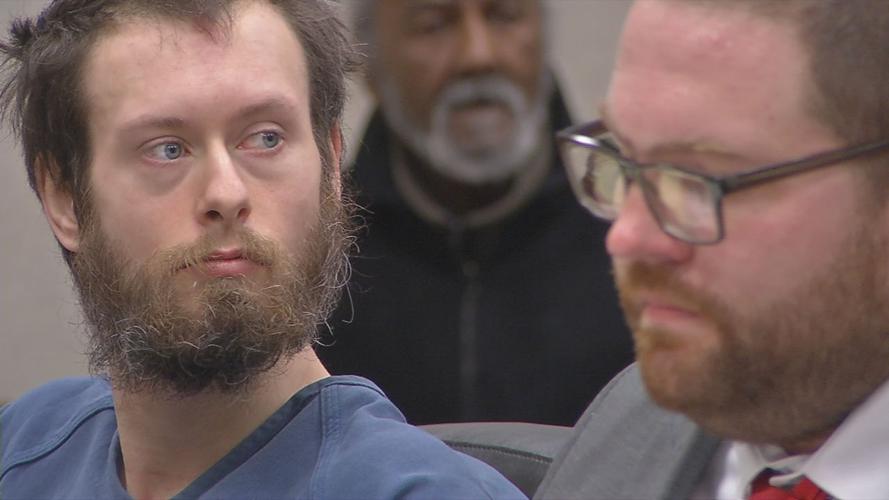LOUISVILLE, Ky. (WDRB) -- State lawmakers are looking to address a dangerous loophole in Kentucky law with its "Safer Kentucky Act."
The sweeping anti-crime legislation, House Bill 5, was introduced in September 2023 by a group of Louisville lawmakers. It's a priority for state Republicans during their 60-day legislative session.
Lawmakers spent months meeting with stakeholders and tinkering with many of the provisions. It's a more than 20-point plan aimed at curbing what's been a multiyear surge in violent crime.
The loophole it hopes to address is in what is known as the "Cane Madden" law, and came to light in the case of Gavin Perkins last year.
Perkins was repeatedly ruled not competent to stand trial for the 2018 murder of his mother, Ruth Perkins. He had been incarcerated or in a psychiatric hospital since he allegedly shot and killed his 69-year-old mother in April 2018 at an east Louisville apartment complex.

Ruth Perkins was allegedly shot to death by her son, Gavin Perkins, in April 2018.
His case attracted widespread criticism and interest last year, as it appeared that not only would he not stand trial for the alleged murder but be released after Central State Hospital officials testified in April 2023 they could no longer keep him in custody. A judge sided with Central State, which said Perkins wasn't benefiting from treatment and the facility could no longer continue to hold him under Kentucky law.
However, Perkins remained hospitalized by his own choice, according to people familiar with the case. He was later indicted again in the same murder by Attorney General Daniel Cameron's office, in part because he could leave the hospital at any time.

Gavin Perkins, who is accused of shooting and killing his mother, was booked into Louisville Metro Corrections on Friday, June 23, 2023, after Kentucky Attorney General Daniel Cameron announced his murder indictment earlier in the week. (Louisville Metro Department of Corrections photo)
The family of Perkins' mother, Ruth, as well as Gov. Andy Beshear had pushed for Cameron's office to take up the case, as they believe he is still a danger.
Cane Madden is a Louisville man who continued to commit crimes, and found incompetent to stand trial but also failed to meet the criteria for involuntary hospitalization, over and over for several years.
Most recently, Madden was charged with the August 2019 beating and rape of a Louisville child until he was found mentally incompetent to stand trial on March 11, 2020.
In multiple instances in the past, Madden had been found incompetent and failed to meet this mental health criteria — meaning he repeatedly walked free — dodging both incarceration and mental health treatment. In Madden's case, psychiatrist ruled treatment would not help him.
On April 1, 2021, Beshear signed a bill into law that patched that gap in state law as it related to Madden's situation. Under the law, a defendant found incompetent has an evidentiary hearing, in front of a judge, to determine if there is a probability the person committed the crime. The defendant will have an attorney for this hearing.
If a judge finds there is a preponderance of evidence of guilt, there will be another hearing to determine whether it is in the best interest of the defendant and the community for the person to be involuntarily hospitalized using four new criteria, such as whether the person was a danger to themselves or others.
If the defendant is hospitalized, a judge would periodically review the status of the person.
That law was meant for defendants with multiple crimes. It did not apply to Perkins, because he had no prior criminal history.
The proposed Safer Kentucky Act would remove the section of the law about a history of criminal behavior. Meaning in a case like Perkins, a person could remain involuntarily committed.
"If there is no history, which is was the case here, then we have to deal with the danger to the community, and to make sure that the community is safe, and that the person gets treatment," said Sheila Schuster, the executive director of the Kentucky Mental Health Coalition.
Schuster, discussed the loophole with Rep. Jason Nemes, R-Louisville, at the end of the 2023 legislative session.
Schuster said that the Safer Kentucky Act only address involuntary commitment of people with mental illness that have committed a crime, referred to state law as KRS 202c. She said it does not change KRS 202a, which addresses mental health inquest warrants, or involuntary commitment for those with mental illness that have not committed a crime.
"One of the concerns, I think, is that there are probably more of these cases out there of people that I think people would say just snap and do something violent, commit a violent offense, hopefully not murder, but it could be and don't have that history of criminal behavior or hospitalizations," Schuster said. "Under this, they would then be remanded to the psychiatric forensic facility where they would get extended treatment, and where actually there would be work done to try to get them to a point where they would be competent to stand trial. That's really the goal. So will we have more people committed under this? The answer is probably yes. Will there be hoards of new people? I think the answer is probably no."
Rep. Kevin Bratcher, R-Louisville, is one of the sponsors for the Kentucky Safer Act.
"I think, just cleaning up that loophole is the biggest part of when it comes to people that are, you know, mentally unfit to stand trial," Bratcher said. "It's kind of an area that the courts have wrestled with and they're telling us to fix it and I think that this time, it will be fixed. It's been demonstrated that if they are not safe to go back out into society, then they are going to be detained and, and given the help they need, hopefully."
Bratcher said this puts a lot of faith in judges, who will evaluate the decisions to involuntary commit someone.
Related Stories:
- Louisville man found incompetent to stand trial for 2018 murder of his mom to be tested again in next 2 months
- Louisville man found incompetent for trial for 2018 murder of mom to remain in jail while tested again
- Louisville man accused of murdering his mother booked into jail on new indictment
- Attorney general gets new indictment against Louisville man accused of killing his mom
- Family says Louisville man accused of killing his own mother is still in custody despite possible release
- Attorney general to examine case in attempt to keep Louisville man accused of killing his mom in custody
- Prosecutor asks that Louisville man accused of killing mom remain hospitalized
- Man accused of killing 69-year-old mother in east Louisville appears in court
- UPDATE: Police arrest son of 69-year-old woman found shot to death in east Louisville
Copyright 2024 WDRB Media. All Rights Reserved.

















